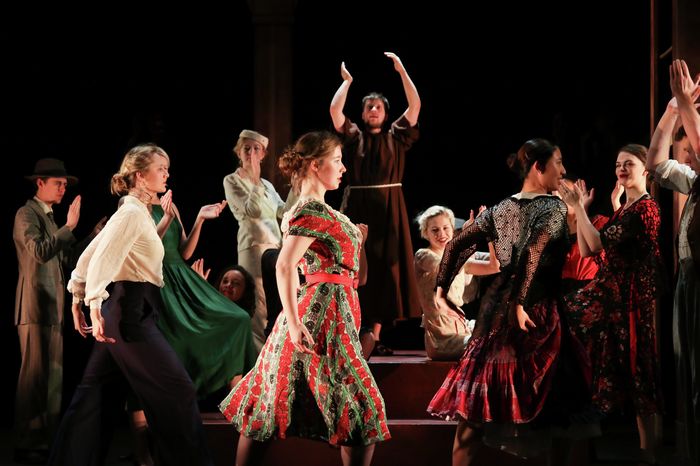The Power of Musical Theatre
Columnist Isabel Burns defends the effect of this too often overlooked theatrical genre

Musical Theatre undoubtedly divides opinion. Recently, my housemate and I debated our opinions on the different versions of Les Miserables. She likes the TV version (the one with no singing or Aron Tveit), which I find incomprehensible. While we were talking, she made a comment that encapsulated most peoples’ problem with musicals: ‘why are they singing all the time? People don’t do that in real life.’ Well, no, they don’t. But my response to this is always ‘wouldn’t everything be more fun if they did?’
But when reality looks like it does in 2020, why would you want to see it as well as having to live it?
It’s difficult to write about theatre at the moment. Live performances are on hold due to the current national restrictions, and streamed theatre has lost some of the momentum it had during the first lockdown. Capturing the effects of musical theatre in a recording has always had its limitations anyway, as there are so many challenges in editing a film of an on-stage performance. There is so much to be encapsulated in a live stream, for instance, the quality of the music and the special effects. And then there are the problems posed by editing; balancing the presence of the chorus with the ultimate centrality of the main actors… the issues are endless.
Despite this, during my two weeks of isolation I have found the escapism offered by musical theatre’s searing solos, cheerful group numbers, and all absorbing sentiment impossible to match. As a child, I first came to musical theatre through the Original Cast Recordings of shows I’d never seen - I would listen to them and fill in the gaps, imagining both the staging and the plot. Finding myself (again) in lockdown, and unable to see any theatre live, I am rediscovering these albums. With headphones on and the volume high, I have journeyed deep to the underworld (Hadestown), danced around my room with cheerful orphans (Annie and Newsies) and, on the days when my lockdown frustration peaked, helped JD kill the dinosaurs (Heathers).
None of these shows are realistic (if you want gritty drama, go to Netflix). But realism isn’t why people watch musical theatre. The aim of all theatre is not to exactly mimic life; we’re all aware, as we sit there watching the stage, that this isn’t what the world looks like. But when reality looks like it does in 2020, why would you want to see it as well as having to live it? Why wouldn’t you occasionally embrace the absurdly theatrical?
These songs have power, they encourage empathy; they’re loud enough, emotional enough, that they refuse to be ignored.
There is sometimes a perception that musicals are shallow. This is partly snobbery; West End musicals, although just as expensive (and occasionally more so) than their music-less counterparts, are a great deal more popular than other forms of theatre. The perception is also partly down to a belief that the key elements of ‘the musical’ obscure artistic truth; that all the singing, dancing and flying through the wings somehow makes these shows less emotionally genuine. Nothing could be further from the truth.
Who could fail to be moved be Eliza Hamilton, cradling her son’s lifeless body whilst realising her husband is to blame? What better testament is there to the pain of lost innocence than Fontane’s ‘he took my childhood in his stride, but he was gone when morning came’. It is no coincidence that pro-democracy protests in Hong Kong used ‘Do You Hear the People Sing?’ to encapsulate the refusal of youth to bow to tyranny. These songs have power, they encourage empathy; they’re loud enough, emotional enough, that they refuse to be ignored. This intensity is their greatest strength.
Musicals take what everyone feels - those feelings we hide when we shrug and go ‘I’m fine’, or mutter ‘he doesn’t like me like that’, or write angry diary entries and WhatsApp messages. They take these underplayed but universal emotions and blow them wide open. The highest highs and lowest lows of human experience are expressed, not just through the actors' performance, but also through music and dance, and this combination gives musicals an unparalleled emotional intensity.
I know not everyone can be convinced to back team ‘Musical Theatre’. For many they’re just a bit much (too much ‘performativity’ for some to find it engaging or entertaining). But, equally, I know I’m not alone in my love of the musical. And if there was ever a time to surrender to the music, turn up the volume and dust off those Old Cast Recordings (or at least rescue them from the bottom of your Spotify playlists) then surely it’s now.
 Music / The pipes are calling: the life of a Cambridge Organ Scholar25 April 2025
Music / The pipes are calling: the life of a Cambridge Organ Scholar25 April 2025 Arts / Plays and playing truant: Stephen Fry’s Cambridge25 April 2025
Arts / Plays and playing truant: Stephen Fry’s Cambridge25 April 2025 Comment / Cambridge builds up the housing crisis25 April 2025
Comment / Cambridge builds up the housing crisis25 April 2025 Interviews / Dr Ally Louks on going viral for all the wrong reasons25 April 2025
Interviews / Dr Ally Louks on going viral for all the wrong reasons25 April 2025 News / Candidates clash over Chancellorship25 April 2025
News / Candidates clash over Chancellorship25 April 2025






